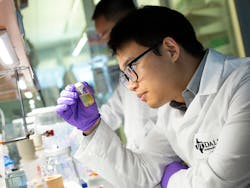A new $2.5 million National Institutes of Health (NIH; Bethesda, MD) grant could give a boost to research happening at the University of Texas at Dallas (Richardson, TX) to develop a fast, simple, and accurate test for viruses such as the flu, respiratory syncytial virus (RSV), and, possibly, the COVID-19 virus. The research team's goal is to develop a more accurate test that could be done while a patient is in the doctor’s office.
The five-year grant will support efforts to advance a novel infectious disease diagnostic approach, develop prototypes, and evaluate the method using clinical specimens, says Dr. Zhenpeng Qin, principal investigator and assistant professor of mechanical engineering in the Erik Jonsson School of Engineering and Computer Science.
The research team's method uses gold nanoparticles, which attach to antibody molecules that can recognize and bind with protein molecules found on the surfaces of viruses. Researchers apply short laser pulses to activate the nanoparticles to generate nanoscale bubbles (nanobubbles). An accumulation of nanobubbles signals the presence of a virus. Qin’s group is not working with the live novel Coronavirus, only with viral genes, proteins, and antibodies. Qin has previously obtained patient samples for his research on RSV and influenza.
The NIH grant (1R01AI151374) is focused on RSV, but Qin says the diagnostic method can be applied to detect other viruses. His work is also supported by a recent $293,000 grant from the Congressionally Directed Medical Research Programs.
For more information, please visit engineering.utdallas.edu.
